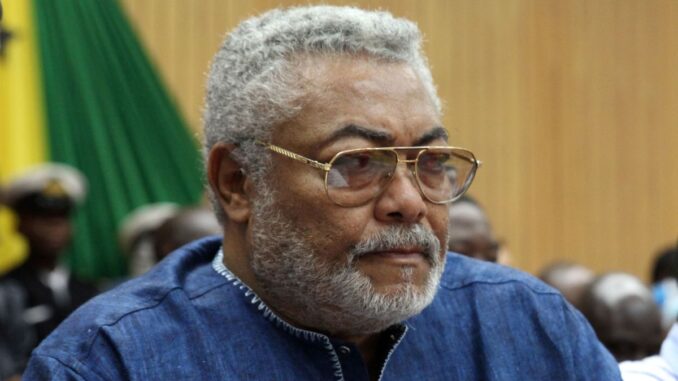
NOTABLY, Jerry Rawlings, who died on November 12, at the age of 73, hit the limelight with a bang. Bullets brought him to power in Ghana. Within a month, he staged two military coups. The first one, on May 15, 1979, failed; and he was tried and sentenced to death by the military regime of Gen. Fred Akuffo. He was a flight lieutenant in the Ghana Air Force. The timing of the coup was curious. It happened five weeks before scheduled democratic elections in the country.
Rawlings was dramatically released from prison by a group of soldiers on June 4, 1979, and led the coup that toppled the Akuffo regime. He was the chairman of the Armed Forces Revolutionary Council (AFRC), comprising mainly junior officers, which ruled Ghana from June to September 1979.
It was a bloody rule that witnessed the execution of eight military officers and three former Ghanaian military heads of state by firing squad. The bloodshed was unprecedented in Ghana’s political history. The violence was meant to cleanse the Augean stables, but the method was condemnable, even if it reflected the logic of military power play.
The Rawlings regime organised elections and handed over power to President Hilla Limann of the People’s National Party (PNP) in September 1979, after an intervention that lasted 112 days. By supervising a quick transition to democracy, Rawlings demonstrated that he was not interested in power for power’s sake.
Rawlings staged a third military coup two years later, in December 1981, an indication of his dissatisfaction with the performance of the democratically elected government and his impatience to develop Ghana. As chairman of the Provisional National Defence Council (PNDC), he set to work with reformist zeal.
Ghana was weakened by socio-economic problems that culminated in a crisis requiring a structural adjustment. His regime’s economic recovery programme helped to pull the country back from the brink.
Again, Rawlings demonstrated his faith in people power by establishing the National Commission on Democracy (NCD) towards charting a democratic transition. Under the PNDC, a new constitution was drafted for the country and the ban on politics was eventually lifted in 1992.
By this time, he had spent 12 years in power as a military ruler. His regime had reversed the socio-economic turbulence of the 1980s, and the restoration of democracy held great promise.
Rawlings ran for president in 1992 and won. He became the first president of the country’s Fourth Republic under the banner of the National Democratic Congress (NDC), which he founded. His self-succession raised moral issues. He later proved that his move to continue to govern the country by dropping his military uniform for civilian clothes was not a sign of power obsession.
After two four-year terms as president (1993 – 2001), allowed by the constitution, he did not attempt any extra-constitutional manoeuvre to continue in office, which was uncommon in African politics. Indeed, he handed over power to an opposition party following his party’s defeat.
There is no doubt that by the time he left office as president, Rawlings had succeeded in making Ghana one of Africa’s most stable democracies. This was a redeeming feature that overshadowed the violence of his early military rule. It is not for nothing that he is regarded as the architect of modern Ghana.
Importantly, his 20 unbroken years in power, as a military head of state and an elected civilian president, were untainted by corruption, the disease of many African leaders.
Born in Ghana to a Scottish father and a Ghanaian mother, he attended Achimota College, Ghana, and joined the Ghana Air Force after his secondary education. He became a flight lieutenant in April 1978, a year before his first involvement in a coup.
His legacy transcends his participation in bloody coups. It is a tribute to him that the progressive party he founded, the NDC, remains a strong force in Ghanaian politics. Its motto, “Unity, stability, and development,” bespeaks Rawlings’ political virtues.
END

Be the first to comment